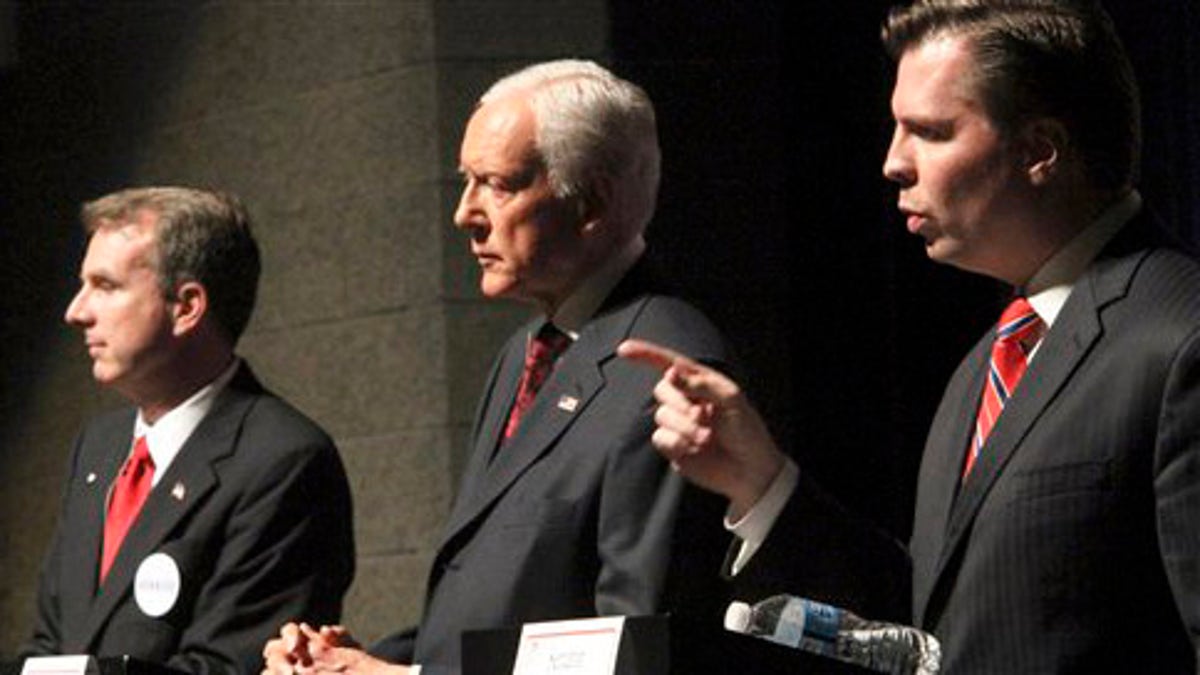
FILE : April 4: Utah Sen. Orrin Hatch, center, faces off with primary candidates Chris Herrod, left, and and Dan Liljenquist, during a debate. (AP)
SANDY, Utah – GOP Sen. Orrin Hatch cleared a big hurdle Saturday in his battle to win a seventh term when he got the most votes at a state party convention -- but not enough votes to avoid a June primary.
Hatch fell just shy of the minimum 60 percent of the vote need from the convention’s 4,000 party delegates, getting 59.19 percent, less than 50 votes short.
He will face state Sen. Dan Liljenquist, who got 40.81 percent of the vote, in the field of 11 candidates.
“Today was a good win for me, and for my campaign,” the 78-year-old Hatch said. “We have come a long way in a short period of time. I am prepared and energized for the battle ahead.”
He still faces a conservative electorate interested in new blood and upset in part because Hatch voted for the Defense Reauthorization Act, which critics say violates citizens’ right to due process.
Beyond Liljenquiest, Hatch’s biggest opponent is perhaps Freedom Works -- the libertarian-based group founded by former Texas GOP Rep. Dick Army. The group has said Hatch supports expansive government and is against economic freedom.
Hatch rejects the argument he is against libertarians, saying it is Freedom Works, specifically, that he does not like.
“I’m offended by Freedom Works … run by radical libertarians,” he said.
Hatch holds a significant fundraising edge in what has become the stiffest challenge since his election to the Senate in 1976.
The eventual Republican nominee will be the heavy favorite in November because of the GOP dominance in Utah.
Hatch urged delegates to endorse him so he can help repeal President Obama's health care law and potentially lead the powerful Senate’s finance committee should Republicans regain control of the chamber in the November vote.
Hatch and Liljenquist, 37, advance to the final round of voting Saturday after the preliminary round in which Hatch got 57 percent of the vote and his challenger took 28 percent.
Though Hatch must continue to campaign and spend money on a primary, finishing in the top two this weekend was still a big victory. Since the beginning of 2011, he has spent more than $5 million -- and he still has $3 million to spend on a primary.
Bennett's loss frustrated many Republicans, who believed that a vocal minority hijacked the nomination process. This year, turnout at the neighborhood caucus meetings more than doubled and many attendees said they wanted to make sure Hatch wasn't treated in the same way.
In 2010, three-term GOP Sen. Bob Bennett was ousted at the caucus level in favor of Tea Party favorite Sen. Mike Lee, who also won in the general election.
Bennett had one of the most conservative voting records in the Senate, but like many 2010 incumbents, he couldn’t overcome the wave of voter dissatisfaction with Congress.
"They were angry because ObamaCare had just been passed and so they flooded the caucus meetings and had a very angry electorate that wanted blood on almost all incumbents," recalled Kirk Jowers, associate professor and director of the University of Utah’s Hinckley Institute of Politics.
In addition, moderate Republicans largely didn’t go to the polls that year, which resulted in a relatively small number of caucus-goers ending Bennett’s run.
Hatch took notice and campaigned hard this year – especially after sensing his candidacy could be in trouble -- to fill the caucuses with a friendlier crowd.
Hatch, ranking Republican member of the Senate Committee on Finance, said before the vote that he was cautiously optimistic.
"I'm a tough old bird,” Hatch has said throughout the campaign. “I can take it.”
Faith Mangan and the Associated Press contributed to this report.




